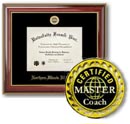|
 Change
Behavior to Change Results
Change
Behavior to Change Results
-the aim for Leadership / Executive Coaching in the workplace
Today's executive / leader is about identity and motive as well as about
action. The leader cares about the people they lead and the
processes they use, as well as about getting the work done. They
choose to lead collaboratively, continue their own self-development
and foster the growth of the personal skills levels and
capacities of their people, enabling them to become more
autonomous and self-responsible. Successful leaders model
this attitude and teach others to also "own it".
Developing effective, visionary
executives / leaders who motivate, engage, spur and retain employees from diverse
backgrounds, as well as tapping into the potential for leadership
within an organization's current employee base, are key
accountability criteria that most organizations aim for when
creating a global leadership development program. Leadership
development programs that truly change and improve skills and expand
the repertoire of leadership styles will generate this return.
The goal of leadership developers, is
to create a vehicle (a change program) to ensure that the time spent
in a professional and personal development program changes
behaviors and enhances performance so that business objectives are
achieved. Although this objective supports targeted
coaching linked to specific business objectives, many professionals
engaged in professional development are either ignoring or facing the
challenge of how to impact an employee's individual
perceptions, self and social awareness, self and relationship
management, and commitment to approaching people and situations
differently than in the past. Individually tailored behavioral-based
experiences create the real return, and the quantifying data that
supports this approach is surfacing in the studies on creating
a range of behavioral competencies.
.>read
more
 Behavioral Range
Behavioral Range
Interdependency and teamwork skills for the global leader are
critical requirements for organizational effectiveness. Key
contributors not only possess information and ideas, but more
importantly, they have the ability to effectively utilize social
networks. People want to discuss, learn, and collaborate with them
because of their ability to build bonds, develop others,
self-manage, listen, share information, and understand. Key
contributors are intuitive about the needs of others, recognize
the nuances of a situation, and seamlessly respond to create
positive outcomes. These are the differentiating factors, the
behavioral smarts that change the landscape of our thinking
about developing effective leaders.
An analogy of the behaviorally
smart leader is the golf pro who assesses a shot, considers
the implications and options, looks in his/her bag of many clubs,
selects, and executes. As he/she plays more, he/she tries
out different strategies, becomes more confident and comfortable,
and the shots become more automatic and more consistently hit
the target. In the same fashion, effective global leaders are those
who develop a range of behavioral competencies, can assess
situations intuitively, make sound choices about what is most needed
by individuals and the group in a range culturally diverse of
situations, and then deliver.
Leadership
Coaching and Executive Coaching
-Working with behavior, leadership
developers as leadership / executive coaches learn:
- All individuals have a profile of
strengths and development areas in a wide range of behavior
competencies.
- The behavioral capacities
uniquely contribute to performance, and certain capacities may
strongly interact.
- The capacities build upon one
another.
- Possessing behavioral underlying
capacities does not guarantee the competencies will be
demonstrated; however, the cultural and organizational climate
and stimulation derived from the work one does encourage the
manifestation of the competencies.
- Each organization, position and
regional location/workplace has its own behavioral reality
or ecology, so different jobs may require strengths in different
competencies.
Behavioral competencies are
not innate talents, but learned abilities, each of which has a
unique contribution to making leaders more resonant, and therefore
more effective. Four basic domains and the clusters of
competencies are: Self-Awareness, Self-Management,
Social Awareness and Relationship Management.
The global leader who can
inspire, motivate, arouse commitment and sustain it, will constantly
strengthen and fine-tune his/her behavioral competencies
and move fluidly between different leadership styles, flexing to
meet the needs of the situation.
 Developing Behavioral Smart
Competencies via Behavioral-Based Coaching
Developing Behavioral Smart
Competencies via Behavioral-Based Coaching
However, developing these behavioral smart competencies will
not occur by simply sharing information and engaging
participants in activities in the traditional training classroom
setting. Leaders first need to recognize the need to change any
behavioral aspect. Behavioral changes begin to occur after the
establishment of a learning plan by a credentialed,
well-trained 'coach'. Through behavioral-based coaching the developing
leader changes his thinking/approach, responds to or engages
differently with others and receives feedback related to
the changes. As he/she experiences improved relationships due
to his/her changed behaviors, he/she psychologically records
the experience because it is positive and feels good. Thus, his/her
behavioral range (BR) increases. |

